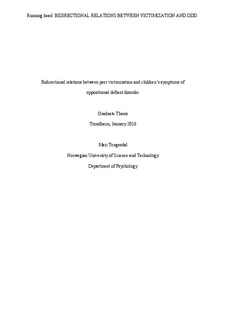Bidirectional relations between peer victimization and children`s symptoms of oppositional defiant disorder
Master thesis
Permanent lenke
http://hdl.handle.net/11250/2400066Utgivelsesdato
2016Metadata
Vis full innførselSamlinger
- Institutt for psykologi [3141]
Sammendrag
Peer victimization has repeatedly been shown to negatively affect children’s physical and
mental health. Oppositional defiant disorder (ODD) is among the most common childhood
psychiatric disorders and research shows that there is an association between victimization and symptoms of ODD. However, because of the cross-sectional design of these studies the direction of influence is unknown: Does victimization cause an increase in ODD symptoms and/or does ODD symptoms increase the risk of victimization? Identifying factors that can increase the risk for ODD or constitute consequences of ODD is important in order to inform prevention and treatment. The purpose of this study was therefore to test if there is a bidirectional relation between victimization and children’s symptoms of ODD in a large sample of 6 year olds (N=790) who were followed up two years later. Children’s ODD symptoms were assessed by the Preschool Age Psychiatric Assessment interview (PAPA) when children were 6 and 8 years old respectively. Six items from the teacher reported questionnaire “The Revised Olweus Victimization Scale” measured victimization. The data were analysed using structural equation model in Mplus. The results showed that symptoms of ODD at age 6 predicted neither direct (e.g. “He/she was ignored by other children”) nor indirect (e.g. “He/she was ignored by other children”) victimization two years later. With regard to the opposite direction of influence, I found that victimization at age 6 predicted ODD symptoms at age 8, over and above children’s initial level of ODD symptoms. Subgroup analyses revealed that indirect victimization prospectively predicted ODD symptoms in boys, whereas this path was not significant for girls. Direct victimization did not predict ODD symptoms two years later neither for boys nor girls. In the current study the prospective relation between ODD symptoms and victimization was not gender dependent.
